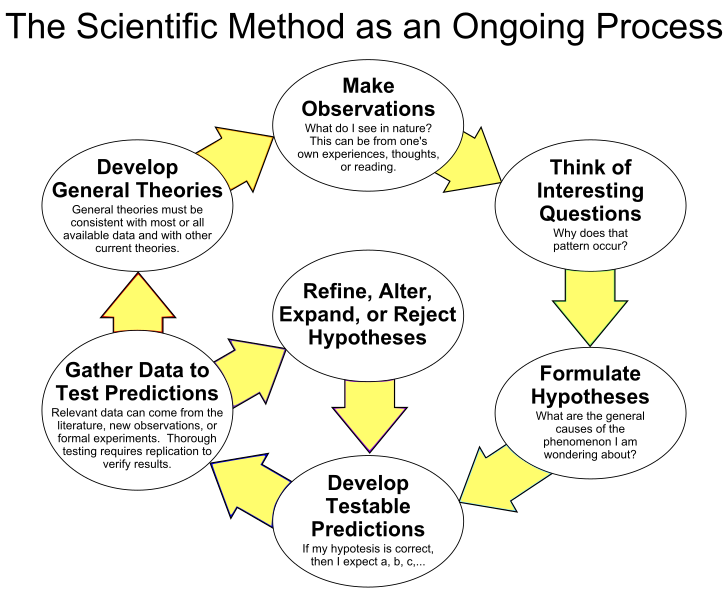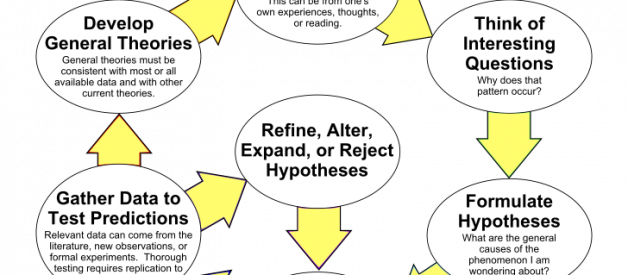There is a common misconception that a scientific law is a more sound version of a scientific theory. This is largely due to the fact that the scientific definition of the word is different than the English definition. In this article we define both terms and compare the two definitions. We then apply these definitions to the definition of the scientific method. Finally, we use these definitions to argue that science is the best tool we have to understand the natural world.
English Definition of Theory
A popular online dictionary defines a theory as ?a proposed explanation whose status is still conjectural and subject to experimentation, in contrast to well-established propositions that are regarded as reporting matters of actual fact.? This is an adequate definition for the word as commonly used in the English language. The fact that the theorist has not researched this theory or even backed it up with evidence does not change the fact that it is a theory in the sense of the English definition.
Scientific Definition of Theory
According to the same dictionary, another definition of theory is ?a coherent group of tested general propositions, commonly regarded as correct, that can be used as principles of explanation and prediction for a class of phenomena.? An example of this type of theory is the general theory of relativity proposed by Albert Einstein in 1916. This is the scientific definition of the word theory, which holds an important distinction from the English definition: a scientific theory must be backed-up with evidence, must be peer-reviewed, and must have passed a rigorous testing process. According to Wikipedia, ?a scientific theory is a well-substantiated explanation of some aspect of the natural world that is acquired through the scientific method and repeatedly tested and confirmed, preferably using a written, predefined, protocol of observations and experiments.? The article continues stating that ?scientific theories are the most reliable, rigorous, and comprehensive form of scientific knowledge.?
The Scientific Method
Suppose that you observed some phenomena and formulated an idea to explain it. In English, you could describe this idea as a theory. In science, this idea would be called a hypothesis. If you wanted to call it a scientific theory you would need to repeatedly develop predictions, gather data to test these predictions, and iteratively refine your hypothesis based on this data. After many iterations, you would submit your hypothesis to the scientific community. If any scientist could disprove your idea, it would be rejected and remain a hypothesis. If no scientist could disprove your idea, it would be accepted and become a scientific theory. This process is known as the scientific method, and has been simplified for the sake of brevity.
 By ArchonMagnus (Own work) CC BY-SA 4.0, via Wikimedia Commons
By ArchonMagnus (Own work) CC BY-SA 4.0, via Wikimedia Commons
Scientific Theory vs Scientific Law
Now that we understand the difference between an English theory and a scientific theory, we can address the difference between a scientific theory and a scientific law. As previously stated, a scientific theory is a well-substantiated explanation of some aspect of the natural world. A scientific law is simply an observation of the phenomenon that the theory attempts to explain. For example, suppose that you were lying under an apple tree and observed an apple fall from a branch to the ground. The observation of this phenomena can be called the law of gravity. The law of gravity states that every time you drop an apple, it will fall to the ground. The theory of gravity is the explanation as to why the apple falls to the ground. A law is an observation. A theory is an explanation.
If you want to learn more about this topic, check out this list of ten revolutionary scientific theories published by Science News.
Just A Theory
Now that these terms have been properly defined, I would like to address a popular argument often used to diminish the validity of a scientific theory. Not all scientific theories are controversial; a new scientific discovery is generally considered accepted after it has passed the peer-review process. However, sometimes a groundbreaking scientific discovery will contradict a popular religion or political party, at which point the result of the theory is almost always contested by the followers of the religion or the members of the political party. These kinds of ideological conflicts often result in heated debates like the infamous Bill Nye-Ken Ham debate in 2014. In these kinds of debates, some people will try to diminish the integrity of a scientific theory by claiming that it?s ?just a theory.? There are many problems with this argument, one of which is that it commits the Ambiguity Logical Fallacy. The argument assumes the English definition of the word theory when using it in a scientific context, thus fallaciously conflating the two terms.
Not only do people that make this argument misunderstand the definitions, they fundamentally misunderstand what science itself actually is. A scientific theory isn?t just a theory, it?s an idea that explains an observed phenomena in the best way we know how. It has passed rigorous testing and an extensive peer-review process. It has achieved the highest honor any idea can in a scientific field. Acknowledging an idea as a scientific theory is acknowledging it as the greatest thing that humans, through science, are capable of creating. For example, the theory of evolution is the best explanation of the observed phenomena of evolution. The current theory is Darwinian evolution through natural selection, and an enormous amount of evidence supports the theory. Scientists encourage you to challenge and be skeptical of the current theory of evolution, as doing so helps refine existing theories into better ones. It does not, however, make sense to refute the massive amount of scientific evidence that supports evolution ? like the existence of fossils of human ancestors, the genetic similarities between nearly all life on this planet, or the peculiar tendencies in nearly all complex life forms that are easily explained and predicted by models like the gene-centered view of evolution popularized by Richard Dawkins in his book The Selfish Gene. We should dispute why what happens happens, but not the fact that it is happening.
Scientific Certainty
Even scientific theories, which have obtained the highest honor anything can in science, are not meant to be taken as absolute truths. While some are based on very sound reasoning and strong evidence, they could one day be proven wrong and every scientists knows it. When scientists discuss well-established scientific theories as if they were true they are allowing themselves a minor degree of technical error to facilitate the expression of information more efficiently. I suspect that there are very few universal truths we will ever discover, and if we prefaced every statement we made with ?evidence strongly suggests that? we would waste an enormous amount of time and energy being unnecessarily redundant.
Some people will try and argue that scientific conclusions should not be trusted because they can change. This line of reasoning stems not only from a fundamental lack of understanding of science, but also of the universe itself. Life is complicated. Reality is illusive. Logic is hard. Also, we aren?t very good at it. But that?s why we created science. The scientific method is the best tool we have to understand the natural world, because it is the only rigorously-defined tool that filters out our personal bias. The fact that any scientific theory could one day be proven wrong, and that a better theory would replace it, is exactly what makes science so good at figuring out what?s actually happening in the universe.
Conclusion
The scientific method allows us to formulate ideas and back them with evidence. They are then shared with a community of other scientists that rigorously try to disprove them. If no one can disprove a hypothesis, it becomes the current working theory. If someone eventually does, the theory is changed or replaced. This process continues and results in better and better ideas being formulated over time. Although the scientific method is not guaranteed to give us the absolutely correct answer, it does help us get closer to that answer. It helps us improve our existing model of the universe and learn from our mistakes.
Science is the process of attempting to understand the natural world through evidence and reason. Scientists have been wrong before, and they will certainly be wrong again. New evidence can change our model of the universe, and that?s okay. The humans that lived on this planet before us for hundreds of thousands of years probably never knew that our planet was round. With Google Earth, I can view a three-dimensional simulation of our whole planet from my living room. That would not be possible without modern science. That would not be possible if we had given up faith in science the first time we misinterpreted scientific evidence. There was a time when we thought the earth was flat, but when new scientific evidence suggested the earth was round we swapped out the old theory for a better one.
It would be great if there was a tool that guaranteed us the absolute correct answer every time, but it is doubtful that such tool exists. Science is by far the best tool we have to understand the natural world, and scientific evidence should not be ignored just because it has been misinterpreted in the past.


